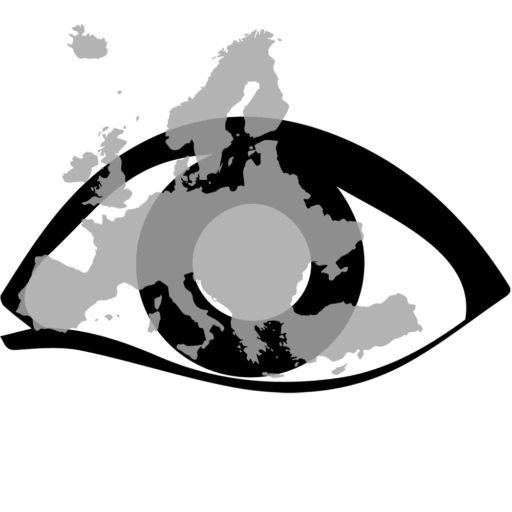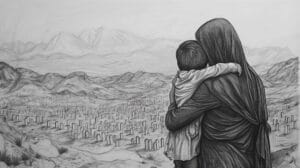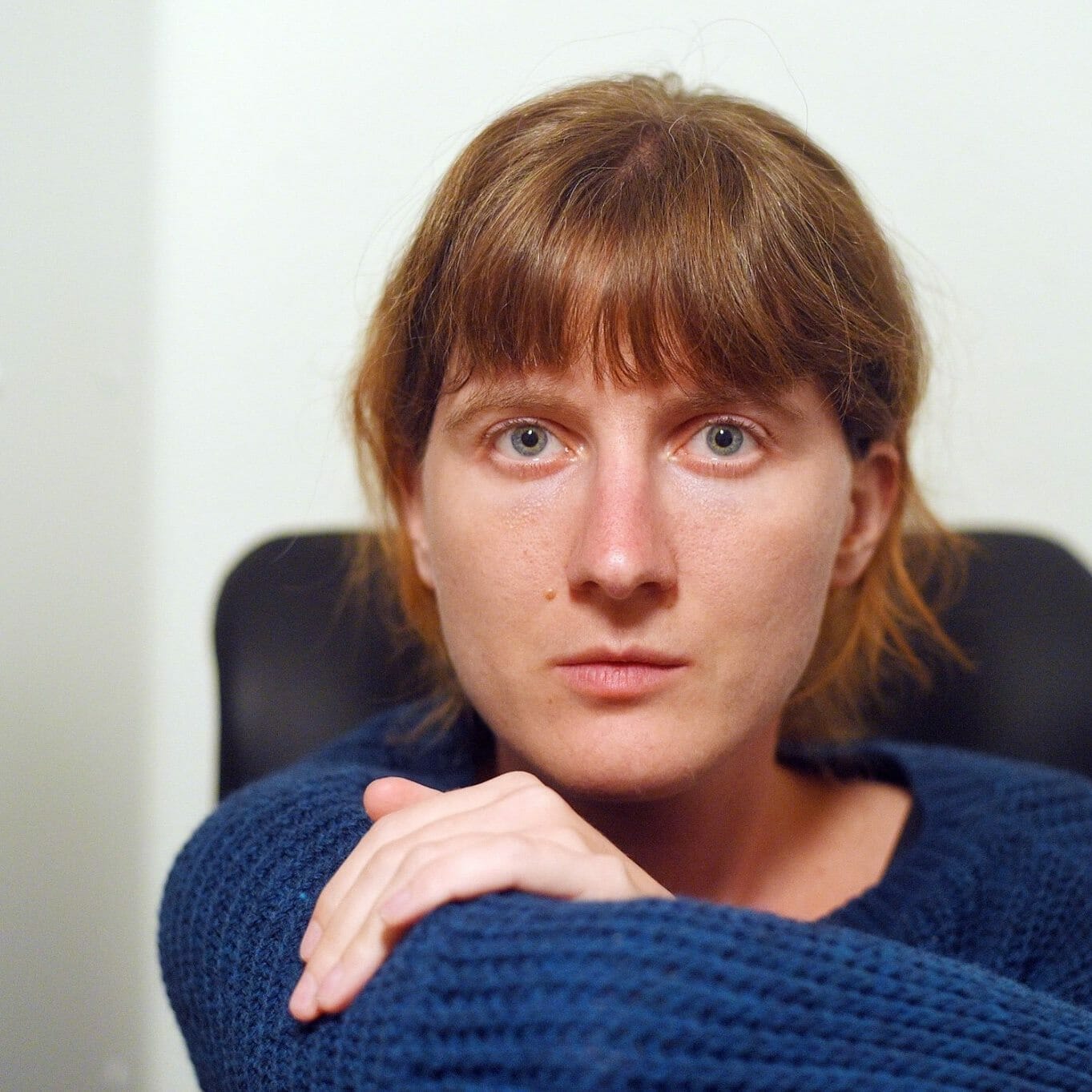Ten years after the genocide: How Yazidi people are faring in Germany
Germany has recognized a genocide. How important it is to be allowed to use this term is currently becoming clear in the context of Gaza. But what impact does such recognition have on the people affected?
Germany has recognized at least one massacre on the Yazidis. On August 3, 2014, terrorists from the so-called “Islamic State” attacked the Sinjar region; they murdered and tortured. Not the first time, as Yazidis repeatedly emphasize. But Germany does not officially recognize the other massacres as genocide.
This is why Dildar Shingaly (artist name) also says of Germany’s move: “It’s good, but it came far too late.” The 27-year-old is a Yazidi himself, survived the genocide and, as a resident of the refugee camp in Dukok in northern Iraq, interviewed women who were victims of the terrorists of the so-called “Islamic State”. He conducted around 100 interviews in this way, but never published them. They serve as an archive of horror.
At least 5000 dead
They are more personal than what the Bundestag cited as supporting facts for the genocide when it recognized it with a broad majority in January 2023: around 5,000 dead, around 7,000 deportees and hundreds of thousands of displaced persons. The number of unreported cases is likely to be significantly higher.
The term “abducted” also conceals more than the mere deprivation of liberty. While the terrorists immediately shot men, boys and older people, they specifically sought out young women and abducted them. Victims report that their kidnappers showed particular interest in those who were still unmarried, “untouched”. They report photos being taken of them, a kind of women’s show, sexual assaults, rapes – repeatedly. They were kept in windowless rooms for days, weeks and months until they had completely lost track of time.
Shingaly has documented all of this in his interviews in Arabic. You can read comparable stories in German here, among others: Raped by the “Islamic State”: “From half past nine the men came” – DER SPIEGEL, here: Genocide: Many Yazidi women are traumatized | ZEIT ONLINE and here: Verdict on Yazidi woman who died of thirst: Life imprisonment for IS supporter – taz.de
Yazidis (also known as Ezidis or Êzidî) are an ethno-religious group with around one million members worldwide. They originally come from Mesopotamia (present-day Iraq, northern Syria and parts of Turkey), but many of them had to flee. Their monotheistic religion is one of the oldest religions in the world that is still practiced; in Armenia and by the United Nations, the Yazidis are recognized as an ethnic minority, whereas in Germany they are considered a religious minority. This issue is also controversial among Yazidis; some see themselves as ethnic Kurds. Germany is home to the largest Yazidi diaspora, with an estimated 300,000 members. Around 80% of their associations (self-declaration of the association) are organized in the Central Council of the History of the Association – Central Council of the Ezidis as their umbrella organization, which was founded in 2017.
Yazidis in Germany
On the tenth anniversary of the genocide, Dildar Shingaly looks at what has changed as a result of the recognition of the genocide and draws a surprising conclusion. After all, the recognition has not led to Yazidi people enjoying more protection. At least in Germany, which now acknowledges the genocide, the situation has been reversed.
“When I came to Germany, I said: ‘I am Yazidi’. They already knew what that meant. I didn’t have to say much,” recalls Shingaly. In 2015 and 2016, it was easy, the problem was well known and the recognition rate in the asylum procedure for Yazidi people was high. “Today, you have to say a lot about how you are personally persecuted,” he says, and yet people are often not granted protection status. There is the idea that the genocide is now “over” and that parts of Syria and Iraq are safe to return to: “If not to the Kurdish areas, then to the Shiites or Sunnis.”
Reports show that the persecution of the Yazidis is not over. To this day, some of those displaced have not been returned to their families. It is unclear whether those affected are still alive at all.
Baden-Württemberg plays a pioneering role
Baden-Württemberg had therefore actually announced a further protection contingent for Yazidi women. The federal state played a pioneering role with the first state reception program for Yazidi women, around nine years ago; since 2015, around 1,000 women have come to southern Germany, some with their children. Further contingents from other federal states have followed. However, the announcement, which is even enshrined in the coalition agreement of the ruling Green and Christian-Democtratic party, has so far had no concrete consequences, as reported by the Kontext weekly newspaper, among others. There is also still no solution for the family reunification of husbands with some of the 1000 women in the first contingent. A total of 18 men are involved, for whom no special solution has been found in almost ten years. “It’s simply ridiculous,” comments Shingaly and explains that Vian (she was visited and interviewed by Lena and Dildar six years ago) has since had to separate from the man she left behind. The chance of being able to live a life together at some point was too hopeless.
In Baden-Württemberg, a memorial was inaugurated on the tenth anniversary; it is intended to commemorate the victims and the sexual assaults. However, Minister President Winfried Kretschmann did not have a solution for the additional contingent or the husbands ready for the sad anniversary, as documented by SWR.
Effects of recognition
Nevertheless, the recognition of the genocide has achieved something, even if not politically, says Shingaly. The Germans, society, now knows about it. There is an awareness of the genocide: “It’s not just journalists who know about it, but also people on the street.” There is interest and support.
Together with other Yazidis, he is campaigning for other countries to follow with recognition, including Austria and Switzerland. This path is not easy. Germany has also shown how complicated it is, even though the facts are known, he says. The national reception programs alone should have provided enough witnesses and evidence.
And Shingaly sees another current challenge: “The AfD wants to use us as an argument against Islam. We have to defend ourselves against that. Unfortunately, some people don’t understand what the party actually wants.”
Shingaly has published the complete conversation on the topic on its YouTube channel:
Post published on August 3, 2024
Last edited on August 3, 2024
[mc4wp_form id=239488]


